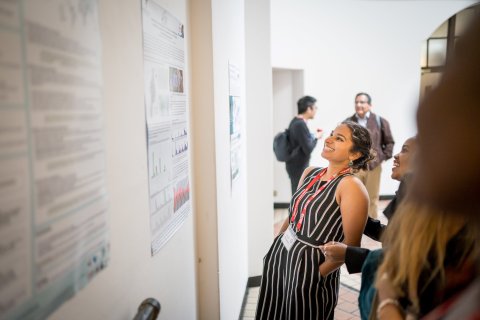In Person Event- Research in Progress Liverpool

RSTMH Liverpool Research In Progress taking place on Thursday 4 April 2024 in the Nuffield Lecture Theatre, Liverpool School of Tropical Medicine, Liverpool, UK. This meeting is being delivered as a partnership between RSTMH and the Liverpool School of Tropical Medicine.
Our Research in Progress events are designed specifically for early career investigators to present their unpublished research in progress to peers and senior experts in all fields of tropical medicine and global health. Attendees will also have the opportunity to take part in guidance sessions throughout the day. Lunch and refreshments will be provided, along with opportunities to network. Certificates of attendance will be provided.
We will be hearing from our keynote speakers: Dr Natalie Roberts, Executive Director of Médecins Sans Frontières (MSF, UK), who will be speaking on MSF and humanitarian health and Professor Jonathan Ball, Deputy Director of Liverpool School of Tropical Medicine and Professor of Molecular Virology, who will be speaking on HIV, emerging virus infections, VLPs and his experience in higher education leadership roles.
We will also be running guidance sessions on:
- How to get funding- Tamar Ghosh
- How to get published- Thomas Pinfield
- How to communicate your research - Dr Elli Wright, and Clare Bebb

Dr Natalie Roberts
Dr Natalie Roberts is the Executive Director of Médecins Sans Frontières (MSF) in the UK. A medical doctor originally from Wrexham, Wales, she has worked for MSF in various medical humanitarian contexts in Africa, Asia and the Middle East, including in settings of violence and conflict, infectious disease outbreaks, population displacement, natural disaster and nutritional crises. Between 2016 and 2019 Natalie was the Head of Emergency Operations for MSF in Paris, during which time she was involved in the response to conflicts in NE Nigeria, Iraq, Syria, Yemen and Gaza, epidemics of cholera, measles and diphtheria, and the world’s 2nd largest Ebola outbreak in Eastern DRC. She was the lead for MSF in designing and implementing the study of a second Ebola vaccine during the outbreak. Between 2020 and 2022 she was a Director of Studies at Crash, an MSF thinktank, where the focus of her reflection was MSF’s positioning and practices relating to epidemic response, including the Covid pandemic. Natalie holds a medical degree from Cambridge University and Imperial College London. She also holds an MA in the History and Philosophy of Science from Cambridge, an MSc in Violence, Conflict and Development from SOAS London, and a Diploma in Tropical Medicine and Hygiene from LSTM.

Professor Jonathan Ball
Deputy Director of Liverpool School of Tropical Medicine and Professor of Molecular Virology. Jonathan took up his role of Deputy Director at the Liverpool School of Tropical Medicine in October 2023. Before this he was founding Director of the University of Nottingham’s Wolfson Centre for Global Virus Research – an interdisciplinary team of researchers from across the Schools of Veterinary Medicine and Science, Life Sciences and Biosciences, whose aim was to broaden scientific understanding and pioneer novel approaches to challenging infections of human and veterinary importance. His specific interests centre on antibody-based vaccine and/or therapeutic monoclonal antibody discovery for emerging virus infections such as Ebola, Lassa Fever, Nipah, SARS-related coronaviruses. Antibody discovery platforms being utilised include direct single cell cloning of human and/or bovine antibody repertoires. As part of this work, he also investigates the role of virus evolution in antibody escape and also its influence on cell and host tropism.
Abstract Presenters
- Prevalence of, and risks factors associated with depressive symptoms and anxiety, and the impact of REDRESS an integrated case management and mental health skin NTD intervention in Liberia. Carrie Barrett, Liverpool School of Tropical Medicine.
-
A first look at freshwater snail faecal metagenomes and reservoirs of antimicrobial resistance (AMR) in Malawi. Angus More O’Ferrall, Liverpool School of Tropical Medicine
-
Discovery of high-frequency copy number variation at loci associated with insecticide resistance in Aedes aegypti. Henry Youd, Liverpool School of Tropical Medicine
-
Person-centred integrated interventions foster participation and inclusion of persons affected by neglected tropical diseases in Liberia. India Hotopf, Liverpool School of Tropical Medicine.
-
M-Lab: a proof-of-principle study exploring molecular xenomonitoring of tsetse (Glossina sp.) in a point-of-need setting. Isabel Saldanha, Liverpool School of Tropical Medicine
-
Engineering increased precision in gene editing mosquito vectors for more effective control strategies. Nicole Page, Liverpool School of Tropical Medicine.
-
A comparative genomics approach to analyse antimicrobial resistance trends in ESBL-Enterobactericeae among Tanzanian neonates recruited into a probiotic clinical trial, ProRIDE.Ralfh Pulmones, Liverpool School of Tropical Medicine.
-
Targeted surveillance of ESBL-producing Escherichia coli in care settings. Sarah Gallichan, Liverpool School of Tropical Medicine.
-
Presence of hybrid and mixed genital schistosomiasis with associated infections in men and women of Nsanje and Mangochi districts in Southern Malawi. Sekeleghe Kayuni, Malawi Liverpool Wellcome Programme (MLW).
-
A realist process evaluation of the implementation of PANDA e-health system trial to increase antenatal contacts and improve perinatal outcomes in Tanzania. Valentina Actis Danna, Liverpool School of Tropical Medicine
-
Urban waste and Human Health: Mapping urban waste in an informal settlement in Malawi to explore associations with human ill-health. Patrick Kalonde, Malawi Liverpool Wellcome Programme.
-
Diagnostic Accuracy and Inter-Observer Variation of Heart Failure Aetiology diagnosis using the Cardiac Ultrasound in Resource-Limited Settings Protocol in a Kenyan patient Cohort. Benedict Porter, Worldwide Radiology
Poster Presenters
- Home-collected dried blood spot (DBS) C-peptide measurements show robust performance in assessing endogenous insulin secretion in individuals diagnosed with type 1 diabetes in sub-Saharan Africa. Jean Claude Katte, University of Exeter.
- The Art of Inclusion: Mainstreaming the rights of people with psychosocial disability within health and social systems. Shahreen Chowdhury, Liverpool School of Tropical Medicine
- Prevalence of alcohol misuse in patients diagnosed with cardiovascular disease (CVD) in Abuja, Nigeria. Elonna Marylyn Obak, Health Improvement Scotland
- The RNA Virome of human and animal parasitic nematodes. Shannon Quek, Liverpool School of Tropical Medicine
- One-click power analysis for WHO bioassays: making robust, simulation-based sample size calculations accessible via browser applications. Frank Mechan, Liverpool School of Tropical Medicine
- Sigmoid Schistosomiasis Granuloma Manifested as a Large Painless Supra-pubic Mass . Ayman Hamid Mohammed Omer, Kassala teaching hospital
- The potential use of Areca catechu as an alternative bioinsecticides. Rajiv Ravi, University Malaya (UM).
- Can Midwifery-Led care (MLC) be practised in a refugee camp setting? A case study from the Azraq camp of Syrian refugees, in Jordan. Nour Essale, Liverpool School of Tropical Medicine.
- Antibacterial And Antibiofilm Activities Of Uvaria Chamae B. Beauv. Bolaji Oluremi, University of Ibadan, Ibadan, Nigeria
- Health system strengthening and community action: supporting health system and community preparedness for health outbreaks in Freetown, Sierra Leone: a community-based participatory research scoping study. Motto Nganda, Liverpool School of Tropical Medicine
- Science Communication, coloniality and BAME communities in Britain: An analysis of peer-reviewed publications and social media posts around the COVID-19 pandemic Elizabeth Neri, University of Cambridge School of Clinical Medicine
- The use of Binomial mixed-effects models in predicting migrants’ infection statuses for Soil Transmitted Helminths in Naples, Italy. Jana Rychnovsky, Lancaster University
- The efficacy of soap against the attachment or penetration of schistosome cercariae to mouse tails. Jiaodi Zhang, Imperial College London
- A feasibility study of controlled human infection with intradermal Bacillus Calmette–Guérin (BCG) injection: Pilot BCG controlled human infection model. Victoria Simpson, Liverpool School of Tropical Medicine